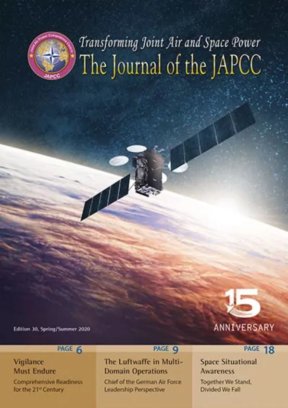New Threats and Challenges to the Alliance
NATO’s comprehensive deterrence and defence activities continue to sustain peace and defend the sovereignty of member nations across the Euro-Atlantic area with overwhelming success. However, we must maintain positive campaign momentum with respect to our speed, stance, and readiness. This relentless pursuit is required to maintain our competitive edge in an ever-changing security environment. Threats and challenges are stressing the rules-based international order and seeking advantage through the application of various instruments of power, backed by increasingly capable forces.
We face a much-changed security environment and a more unpredictable world. The sovereignty of NATO nations and the means to secure their territorial integrity are being confronted below the level of armed conflict. Continued malign information activities and exploitation of free access to Western economies are some ways challengers are attempting to seek advantage. Unchecked, these activities could escalate into more aggressive behaviour. NATO’s new Military Strategy of 2019 acknowledges these challenges and clearly articulates the enduring vigilance activities the Alliance must embrace to sustain peace through comprehensive deterrence and defence.
Comprehensive 360-degree Deterrence and Defence
The Alliance has already implemented a multitude of decisive actions to address these new challenges. NATO has established two new military headquarters, Joint Force Command Norfolk in the US and Joint Support and Enabling Command in Ulm, Germany to strengthen transatlantic lines of communication and rear area logistics coordination in Europe. These headquarters increase our ability to command and control, enable deployment, and sustain NATO forces in crisis through conflict. We have also made progress in improving infrastructure and transit procedures to facilitate the rapid movement of forces. While we have modified Exercise Defender-Europe 2020 as part of prudent efforts to minimize the spread of COVID-19, coordination, planning, and much of the logistics work still occurred. Though modified, this major exercise provided the opportunity to demonstrate capability, evaluate our procedures, and to identify areas for further improvement. Through continued alert and air policing activities, our standing maritime groups, and our forward presence of land battle groups … we have considerably improved our all-domain security, awareness, and indications and warnings. NATO’s formal declaration of space as an operational domain offers tremendous implications for other domains and adds to our comprehensive thinking and approach. We have heightened our readiness and continue to improve our posture.
Allied Command Operations has taken measures to improve our posture in the information domain as well. Our nations are improving alignment with whole-of-government activities. In cyberspace, the Cyber Operations Centre at the Supreme Headquarters Allied Powers Europe (SHAPE) enhances our situational awareness and provides centralized planning and command and control for cyberspace aspects of Alliance operations and missions. Dedicated educational efforts, agreement on integration of sovereign cyber effects, efforts to improve the hygiene of our networks, and increased resilience of our command and control nodes have all improved our vigilance in this ubiquitous 21st century domain.
Pushing Posture, Speed, and Readiness to the Highest Prudent Levels
In all domains – air, land, sea, space, and cyber – we must continue to explore ways to ensure our ability to deliver effects quicker than ever before. We must continue to present our capabilities and forces in unique and unpredictable ways to enable simultaneous all-domain action. Pushing comprehensive readiness to the highest prudent levels, and being able to employ our capabilities faster than our threats or challengers is the most potent way to communicate our resolve and sustain peace.
To ensure the further development of our capabilities while improving NATO’s training, readiness and responsiveness, it is of utmost importance for NATO’s Centres of Excellence (CoE), such as the Joint Air Power Competence Centre (JAPCC), to continue their outstanding work. Innovative thoughts, concepts, and well-founded recommendations to address developments in the Air and Space domains are foundational for delivering decisive effects. We must leverage our CoEs to do heavy thinking on the critical questions of today and tomorrow. How do we enhance our ability to ensure effective Command and Control (C2) in a joint, all-domain environment? How can Artificial Intelligence support military planning? How can the handling of big data play an essential role in enabling a rapid response across the peace, crisis, and conflict spectrum? The answers to these questions require much thought, and effort … but are vital to maintaining our competitive advantage. Our ability to preserve security for the one billion people we are sworn to protect depends on the quality of these answers and our action on these questions and more.
Effective Solutions for Air and Space Power Challenges
Established 15 years ago in 2005, the JAPCC is the Alliance’s oldest and first accredited CoE. At its founding, JAPCC was chartered to support the transformation of NATO Air and Space Power. To enable this important effort, a unique organizational construct was established linking the operational and tactical level command of NATO’s air capabilities at Headquarters Allied Air Command (HQ AIRCOM) in Ramstein and the Combined Air Operations Centre (CAOC) Uedem, to the CoE. Over the years, the JAPCC has fully matured into a well-versed centre of expertise, delivering valuable contributions to the development of NATO concepts and doctrine. The JAPCC’s annual Air and Space Power Conference, as well as the variety of its publications, offer opportunities to the Air and Space community to exchange thoughts, assessments, and perspectives.
These forums, the conceptual thought, and doctrinal work of the CoE reinforce JAPCC’s mission, to offer independent thought and provide effective solutions to Air and Space Power challenges as a basis for well-informed decisions by leaders of NATO and our nations. We have no doubt the JAPCC will continue to be a game-winning advantage for our development of the Alliance’s Air and Space capabilities for years to come. These concepts and advice are equally relevant to leaders and operators alike.
On behalf of the men and women of Allied Command Operations, we offer our deepest gratitude to the members of the JAPCC for their dedicated work and congratulate this world-class team on 15 years of great work. Stay the course!












